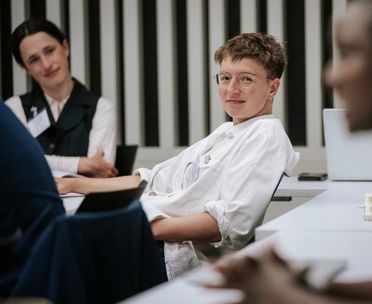

Michaela Bakala for Heroine magazine: Society's Progress Halts Without Media Education
February 3, 2022
The article by Michaela Bakala was written in collaboration with HEROINE magazine, where it was published on 3 February, 2022.
Purposeful lies, distorted facts, and alarmist news have been around for ages, but today, the speed with which they are spread, their elaboration, and influence has changed significantly. And since misinformation is likely to be with us for a long time to come, we must prepare for it properly.
As a mum of four school-aged children during the transition to online learning, I have found that time spent on the internet and social media significantly impacts children. In the Czech Republic, schoolchildren aged 12-14 spend 184 minutes online every day, and this time continues to increase as they get older, with 15 and 16-year-olds surfing the internet for an average of 252 minutes. Yet, according to the EU Kids Online 2020 survey, only one-quarter of Czech children say they find it very easy to check the news and are confident about the value of the information they receive. Not that we adults are any better off...
The solution and the best prevention is media education. Media literacy is becoming the key skill of our time. It is up to parents and teachers to develop children's ability to think critically about what they see, hear, and perhaps even read. But not all schools devote sufficient space to media education.
There are several organizations currently active in the field of media education in the Czech Republic. Some of them offer unique or tailor-made programs for schools. The problem is that they are usually only known to those actively interested in the subject themselves. With our foundation, we decided to support the media education program One World at Schools (JSNS) of People in Need, which targets children aged 11-14 and includes working with teachers teaching media literacy. We must teach media literacy creatively for children in this critical age group. JSNS offers teachers inspiration, practical teaching materials, and the opportunity for further training.
So, what should children learn before they sit down at the computer or with their mobile phones again? And how can we as parents help them? Start by measuring your media literacy yourself or together with your children. You can also take the MQtester, available on the jsns.cz website where you will also get a lot of information and practical tips.
The very first level of the test focuses on manipulation through photomontages. Videos and photos are among the most popular internet content; many, if not all, teenagers watch, share or create them themselves. But can they recognize whether the photos have been edited and thus its reality altered? There are many techniques used to manipulate the news in the media world. For example, an article's headline plays a significant role, as do the graphics used to embellish the report.
In the test, you will see if you can spot fake news, deepfake, or hoax - quite possibly not, their danger lies in their veracity. But for children, it is essential to know that such frauds exist and understand who creates them and why. It is also helpful to be able to spot a fake account or a parody site. Media literacy also includes the ability to recognize advertising. The test, therefore, also offers specific examples of hidden forms of advertising that target children on social media. If you take the test with your children, which I highly recommend, you can compare answers and exchange opinions during the debate. The same goes for teachers; the test can be the basis for a proper and respectful discussion in the classroom. By the way, have you ever wondered when or in what subject your children will have media education classes at school?
As a professional working in media and communication fields since the 1990s, I consider the spread of misinformation one of the most pressing issues facing the world today. We don't have to look far for examples. The current pan-democracy, which the whole world has been fighting for two years now, shows us the enormous power of fake news, its massive impact on the fragmentation of opinion, and consequently, on the division of society.
We must assess the reliability of sources and respect facts and science because both are being questioned and relativized today. Let us not be drawn in by conspiracies and scared by obscure news with scandalous headlines. Instead, let us lead children to critical thinking and media literacy. Truthful information and transparency are the basis for the healthy functioning and prosperity of any democratic society.
Michaela Bakala


